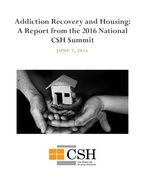Found 20 resources.
0
0
0

The county’s preliminary results look promising: more than 78% of Vital clients were booked into jail less often once enrolled in the program for at least six months. On average, Vital participants went to jail about a third less often per year compared to the three years before their enrollment. A typical client had at least two fewer bookings into a King County Jail compared to the three years before entering the program.
Topics: Criminal justice, Health, Homelessness, Housing, Mental health, Partnerships, Substance abuse
 Shared by Housing Is
on Apr 25, 2019
Shared by Housing Is
on Apr 25, 2019 0
0
0
An Idaho lawsuit concerning how cities across the West enforce laws about sleeping in public—potentially changing how they treat their homeless populations—is now established as precedent. Barring a decision by the Supreme Court to address the case of Martin v. City of Boise, cities will not be able to arrest or punish people for sleeping on public property unless they provide adequate and relatively accessible indoor accommodations.
Topics: Criminal justice, Homelessness, Housing, Legislation & Policy, Low-income
0
0
0
The Legal Bibliography is collection of 100+ papers, toolkits and other materials focused on privacy, consent and policy documentation. Co-developed by the Network for Public Health Law and Data Across Sectors for Health (DASH), the Bibliography is a growing resource for lawyers and community data practitioners, intended to support local collaboratives in their efforts to share data across sectors.
Topics: Criminal justice, Data sharing, Education, Health, Homelessness, Housing, Mental health, Partnerships, Safety
 Shared by Housing Is
on Apr 8, 2019
Shared by Housing Is
on Apr 8, 2019 0
0
0
CSH selected the Center for Data Science and Public Policy (DSaPP) at the University of Chicago to develop a web-based data integration tool, which was completed in 2018. The tool connects county jail administrative data from the justice system to homeless system data, through communities’ Homeless Management Information Systems (HMIS).
Topics: Criminal justice, Data sharing, Homelessness, Housing, Midwest, Partnerships, Supportive housing
 Shared by Housing Is
on Apr 4, 2019
Shared by Housing Is
on Apr 4, 2019 0
0
0

Many former offenders are denied housing — not because of the lack of funds or the failure to meet objective criteria, but because of their criminal history. Case in point: Matthew Charles, one of the first prisoners released under the First Step Act and one of President Trump’s guests at the State of Union address in February, has had difficulty securing an apartment, even with help from Kim Kardashian West.
Topics: Criminal justice, Homelessness, Housing
0
0
0

Launched in 2016, the Denver Supportive Housing SIB aims to support residents struggling with homelessness, substance use, and mental health problems by increasing the number of people getting and staying housed and reducing the number of days they spend in jail. The permanent supportive housing model combines a permanent housing subsidy with wraparound services, such as mental health counseling, to help people improve their stability. In Denver, MHCD and the Colorado Coalition for the Homeless (CCH) were selected to offer these services as part of the SIB.
Topics: Cost effectiveness, Criminal justice, Homelessness, Housing, Low-income, Pacific Northwest, Partnerships, Research, Substance abuse
0
0
0

The city says it plans to move ahead with a costly, stopgap renovation of a New Orleans jail building to house dozens of inmates with mental health issues — but it also wants to keep its options open.
Topics: Criminal justice, Housing, Legislation & Policy, Low-income, Mental health, South, Supportive housing
 Shared by Housing Is
on Feb 28, 2019
Shared by Housing Is
on Feb 28, 2019 0
0
0
Over the past two decades, criminal justice reform has focused on evidence-based interventions to prevent arrests and incarceration and to facilitate community reintegration. These initiatives represent a movement toward a less punitive, more holistic approach to public safety, targeting critical social factors that lead to and perpetuate criminal justice involvement. Because housing problems are often a key underlying factor for people’s involvement with the criminal justice system, there are ways housing interventions can help lessen criminal justice involvement. Decriminalizing...
Topics: Criminal justice, Homelessness, Housing, Legislation & Policy, Low-income, Research, Stability
0
0
0
This series of papers provides an overview and framework for reaching out to stakeholders or potential partners from other sectors that may share your interest in collaborating and sharing data to improve community health. Knowing your audience will help your collaboration craft a successful and productive outreach strategy, strengthen your partnerships, and ensure ongoing sustainability by clearly defining and articulating the value of sharing data across sectors.
Topics: Criminal justice, Health, Homelessness, Housing, Medicaid / Medicare, Partnerships
0
0
0
Decent, stable, and affordable rental housing has the power to improve lives, yet background checks and other systemic barriers reduce housing access and stability for a large part of the population—people who have been arrested or who are reentering communities after incarceration. The number of people who can be shut out of rental housing by criminal background checks and related policies calls for a national and local conversation about evidence-based ways to balance public safety and cohesion goals while supporting people with justice system histories in finding stable housing. Achieving...
Topics: Criminal justice, Homelessness, Housing
 Shared by Housing Is
on Feb 7, 2019
Shared by Housing Is
on Feb 7, 2019 0
0
0
Individuals transitioning out of the criminal justice system need a good place to call home so that they can reconnect with society and rebuild their lives.
Topics: Criminal justice, Homelessness, Housing, Partnerships, Research
0
0
0
On January 1, 2014, in states that have chosen to expand Medicaid eligibility under the Affordable Care Act, nearly all chronically homeless people who lacked health insurance became eligible for Medicaid. This Primer offers state Medicaid officials and other interested parties strategies for using Medicaid to meet the needs of this very vulnerable population--some strategies that have succeeded in the past and some that are emerging under provisions of the Affordable Care Act.
Topics: Affordable Care Act, Criminal justice, Disabilities, Dual-eligibles, Funding, Health, Homelessness, Housing, Low-income, Medicaid / Medicare, Mental health, Partnerships, Stability, Substance abuse, Supportive housing
 Shared by Housing Is
on Jul 27, 2018
Shared by Housing Is
on Jul 27, 2018 0
0
0
Part of New York State’s Homelessness Action Plan includes an investment of new supportive housing resources and services over the next five years to address vulnerable populations experiencing homelessness. Therefore, the availability of and access to various support services such as employment and training opportunities, parenting, counseling, independent living skills training, primary healthcare, substance disorder treatment and mental health care, child care, and benefits advocacy are critical components of any project funded under this plan.
Topics: Cost effectiveness, Criminal justice, Disabilities, Domestic violence, Foster care, Funding, Homelessness, Housing, Medicaid / Medicare, Mental health, Substance abuse, Supportive housing, Youth
 Shared by Housing Is
on Jul 23, 2018
Shared by Housing Is
on Jul 23, 2018 0
0
0
Assisting public housing residents on the path towards self-sufficiency requires going beyond providing decent, safe, and affordable housing. Public housing residents may face barriers to employment, such as limited education, job skills and/or proficiency in the English language. This toolkit is a resource for both frontline staff and management. It offers examples of how partnerships between DOL and HUD can increase public housing resident employment and create mutual benefit for both agencies.
Topics: Criminal justice, Disabilities, Funding, Housing, Legislation & Policy, Low-income, MTW, Partnerships, Workforce development
 Shared by Housing Is
on Jul 19, 2018
Shared by Housing Is
on Jul 19, 2018 0
0
0
The Denver Social Impact Bond program is an initiative aimed at measurably improving the lives of people most in need by driving resources towards better, more effective programs. Social Impact Bonds are a unique type of performance-based contract where private and/or philanthropic lenders loan funds to accomplish a specific objective and are repaid based on whether the program achieves its goals. Denver’s Social Impact Bond program will use funds from lenders to provide housing and supportive case management services to at least 250 homeless individuals who frequently use the city’s...
Topics: Community development, Cost effectiveness, Criminal justice, Health, Homelessness, Housing, Low-income, Mental health, Partnerships, Stability, Substance abuse, West Coast
 Shared by Housing Is
on Jul 17, 2018
Shared by Housing Is
on Jul 17, 2018 0
0
0
Recognizing the layers to developing a health and housing partnership, this Literature Review and Resource Bank is intended to provide background and data resources that can be used in grant applications or in conversations with potential funders in the effort to foster new health and supportive housing partnerships.
Topics: Cost effectiveness, Criminal justice, Data sharing, Dual-eligibles, Funding, Health, Homelessness, Housing, Low-income, Medicaid / Medicare, Mental health, Partnerships, Post-secondary, Preventative care, Research, Seniors, Substance abuse, Supportive housing, Youth
 Shared by Housing Is
on Jul 13, 2018
Shared by Housing Is
on Jul 13, 2018 0
0
0
On June 7, 2016 CSH invited a diverse group of national experts from the housing, homeless prevention, Substance Use Disorder (SUD) treatment, mental health, criminal justice and recovery fields for a special meeting on the topic of addiction recovery and housing. The primary goal of the convening was to engage participants in a thoughtful discussion around how CSH can work with our national and local partners to promote recovery in supportive housing and ensure that supportive housing is part of the continuum of recovery supports available for people living with addiction.
Topics: Criminal justice, Dual-eligibles, Health, Homelessness, Housing, Legislation & Policy, Mental health, Partnerships, Substance abuse, Supportive housing
 Shared by Housing Is
on Jul 12, 2018
Shared by Housing Is
on Jul 12, 2018 0
0
0
This brief explores how state Medicaid agencies have utilized a variety of federal authorities and delivery systems to increase access to supportive housing services and highlights important implementation considerations.
Topics: Cost effectiveness, Criminal justice, Data sharing, Funding, Health, Healthy homes, Homelessness, Housing, Legislation & Policy, Low-income, Medicaid / Medicare, Mental health, Partnerships, Substance abuse, Supportive housing
 Shared by Housing Is
on Jul 10, 2018
Shared by Housing Is
on Jul 10, 2018 0
0
0
Topics: Child welfare, Criminal justice, Domestic violence, East Coast, Family engagement, Housing, Legislation & Policy, Low-income, Research, Safety, Supportive housing, Youth
 Shared by Housing Is
on Jul 10, 2018
Shared by Housing Is
on Jul 10, 2018 0
0
0

It adds to the growing body of evidence that addressing homelessness saves money elsewhere.
Topics: Cost effectiveness, Criminal justice, Health, Healthy homes, Homelessness, Housing, Legislation & Policy, Place-based, Preventative care, Research, Stability, West Coast
 Shared by Housing Is
on Jul 5, 2018
Shared by Housing Is
on Jul 5, 2018 






